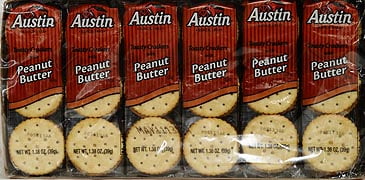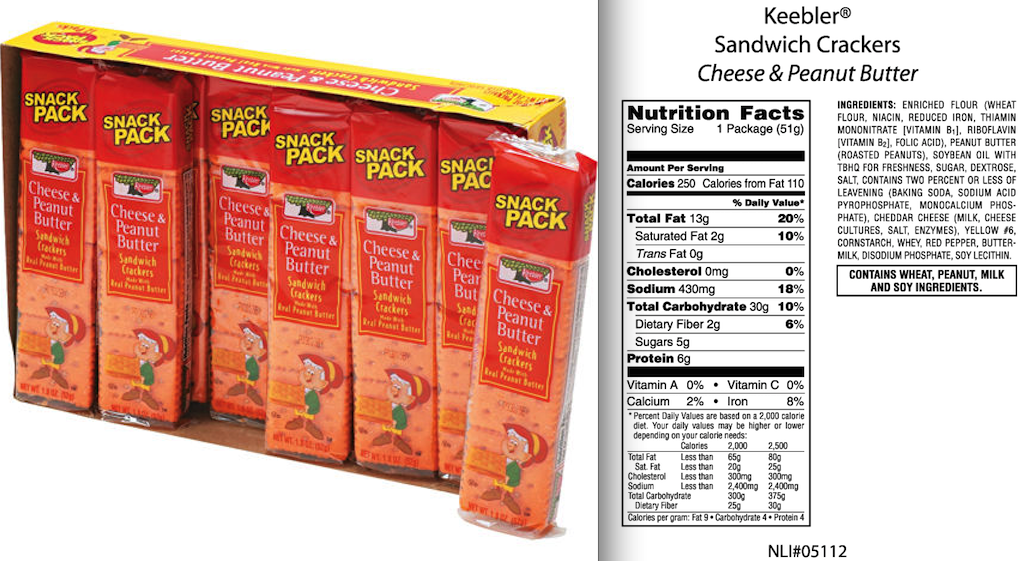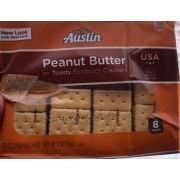

Thank you!įlour ( wheat flour, niacin, reduced iron, thiamin mononitrate ( vitamin b1), riboflavin ( vitamin b2), folic acid), peanut butter ( roasted peanuts), soybean oil with tbhq for freshness, sugar, high fructose corn syrup, dextrose, contains two percent and less of salt, malted barley flour, leavening ( baking soda, monocalcium phosphate, sodium acid pyrophosphate), soy lecithin, cornstarch, yellow #6, cheddar cheese ( pasteurized milk, cheese cultures, salt, enzymes), whey, buttermilk, disodium phosphate, red pepper If you would like to help, join the #ingredients channel on our Slack discussion space and/or learn about ingredients analysis on our wiki. Add new entries, synonyms or translations to our multilingual lists of ingredients, ingredient processing methods, and labels.Edit this product page to correct spelling mistakes in the ingredients list, and/or to remove ingredients in other languages and sentences that are not related to the ingredients.Picture from Famartin, CC BY-SA 4.You can help us recognize more ingredients and better analyze the list of ingredients for this product and others:

You can improve your weight loss by reducing the chances of fluid retention. Crackers and peanut butter both have added salt, which can cause fluid retention and increase your weight. The peanut butter content of this snack can also help reduce hunger pangs, but we don’t recommend that you eat copious amounts of it either.
#AUSTIN TOASTY CRACKERS WITH PEANUT BUTTER NUTRITION HOW TO#
You must know how to control your appetite by eating complex carbohydrates, which break down more slowly and can help keep you feel fuller for a longer period. Peanut butter crackers have plenty of carbohydrates, which means you might feel hungrier faster. Like other foodstuffs, you can gain weight when you too much of anything.

Will Peanut Butter Crackers Make You Gain Weight? Half of the calories in this product is derived from carbohydrates, so it’s not a low-carb food item. Judging from the nutrition facts of Austin peanut butter crackers, we can say that it’s not a bad product at all, and in moderation, it probably won’t hurt your weight loss efforts at all. It also has five grams of added sugars for taste. These crackers do not contain cholesterol and trans fats, but it does have 1.5 grams of saturated fat, 8% of a person’s RDA for this nutrient. Are Peanut Butter Crackers Good for A Diet?Īre Austin peanut butter crackers healthy? One serving of Austin peanut butter crackers provides 190 calories, with 23 grams of carbohydrates, nine grams of fat, a gram of fiber, and four grams of protein. Check the nutrient index of the peanut butter you are buying to ensure that you are not getting too much salt per serving. If you are a salt-sensitive individual, the salt content of all foods may be a problem. Then there’s the issue with salt content, too. Stuff like hydrogenated vegetable oil and trans fats are also added to peanut butter that you buy off supermarket shelves. However, bear in mind that commercial peanut butter also contains additives that may not be so healthy. In general, peanut butter can be considered a healthy foodstuff that can be consumed daily. Peanut butter is naturally oily because peanuts are rich in natural oils. Peanuts are often roasted before being blended until a thick and oily paste emerges. Of course, at the core are peanuts, a steady source of protein and other nutrients that the body needs. This spread has been a classic favorite since time immemorial.

But what is the verdict with this snack? That is what we are going to find out today. Peanut butter crackers are a crowd favorite because the salty and sweet swirl from the peanut butter is a real crowd-pleaser. Is peanut butter good for you? This is likely on your mind if you have begun any weight loss effort or if your physician has advised you that you should be cutting down on unhealthy food.


 0 kommentar(er)
0 kommentar(er)
